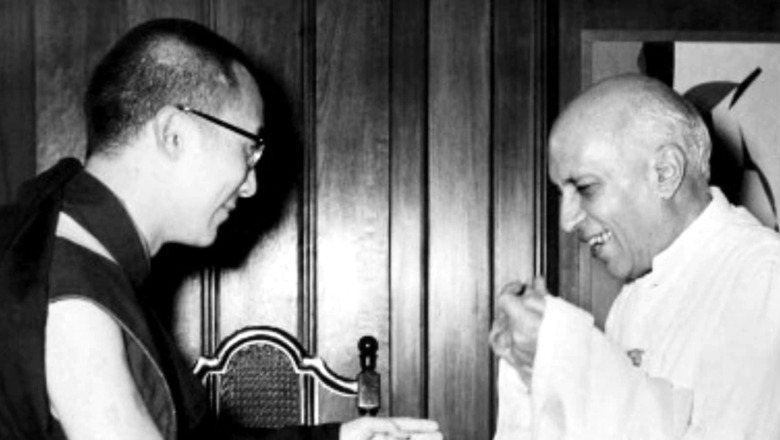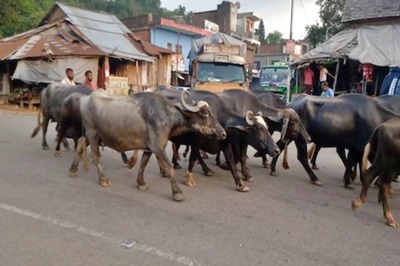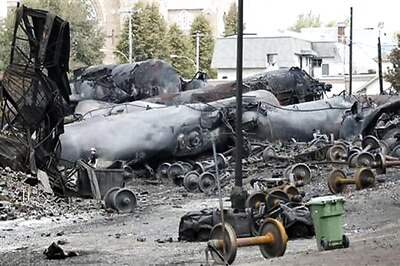
views
Prime Minister Narendra Modi, for the second year, congratulated the Dalai Lama on his birthday on Wednesday in a clear signal to Beijing on India’s shifting stand on the ‘One China’ policy.
India’s message to China is clear: either follow ‘One India’ as a policy measure and leave claims on Ladakh, Sikkim, and Arunachal Pradesh, or see a vocal India against Chinese interests in future including its claims on Taiwan, its occupation of Tibet and Xinjiang, and allegations of human rights violation by China in Tibet, Xinjiang, and Hong Kong.
The Galwan clash of June 2020 where China again tried to intrude and acquire a strategically important geographical piece of land in the Indian Territory, in fact, fundamentally changed the Indian foreign policy towards China. The bloody clashes imposed by Chinese soldiers left 20 Indian soldiers dead. China lost its 45 soldiers as well, as reported by the Russian news agency TASS.
The clear message by the Indian soldiers in the Galwan clash and the public birthday wishes to the Dalai Lama, considered a criminal and traitor by China, underscore that for India, no more Chinese betrayals now— the series of betrayals that started with the 1962 war imposed by China.
It is important to note here that China, then in 1962, used the incident of the Dalai Lama and his government fleeing to India as a pretext to start the war.
The Dalai Lama episode
Though there was no Indian design in the Tibetan uprising of 1959, China conveniently blamed India for it, alleged that India schemed about how the Dalai Lama could flee the Tibetan territory, and claimed that New Delhi was involved in anti-China propaganda and border aggression.
China was always looking for Indian territories, claiming Ladakh, Sikkim, and Arunachal Pradesh as its part right from the first day of its forceful occupation of Tibet in 1949-50. The first Prime Minister of India, Pandit Jawaharlal Nehru, in fact, wrote to the Chinese Premier and Foreign Minister Zhou Enlai on consistent Chinese intrusion into the Indian Territory, on China building a road in Ladakh, and on China arresting Indian soldiers in the Aksai Chin area in 1958.
The Chinese designs of the 1962 war imposed by it become evidently clear when we go through a transcript released by the Woodrow Wilson International Centre for Scholars. It is based on the heated discussion between USSR Premier Nikita Khrushchev and Chinese leaders Mao Zedong and Premier and Foreign Minister Zhou Enlai. The date of the conversation was October 2, 1959, six months after the Dalai Lama fled Tibet, in March 1959, and three years and six months before China attacked India on October 20, 1962.
According to the transcript, the USSR, a communist country, decided not to support China, another communist country, against India which it considered a friend. The USSR, in fact, tried to dissuade China from taking a hostile attitude towards India, believing it could ultimately result in a war. The USSR, in fact, had passed a resolution called ‘TASS Declaration’ to stay neutral in the India-China conflict.
The transcript
Nikita Khrushchev: We….do not understand in particular your conflict with India. You have had good relations with India for many years. Suddenly, here is a bloody incident, as result of which [Prime Minister of India Jawaharlal] Nehru found himself in a very difficult position…..If you let me, I will tell you what a guest should not say the events in Tibet are your fault. You ruled in Tibet, you should have had your intelligence [agencies] there and should have known about the plans and intentions of the Dalai Lama.
Mao Zedong: Nehru also says that the events in Tibet occurred on our fault. Besides, in the Soviet Union they published a TASS declaration on the issue of conflict with India.
Khrushchev believed it was China’s fault that the Dalai Lama could flee Tibet. He also opined, based on the inputs, that China had no control over the Tibetan masses.
Nikita Khrushchev: Do you really want us to approve of your conflict with India? It would be stupid on our part. The TASS declaration was necessary. You still seem to be able to see some difference between Nehru and me. If we had not issued the TASS declaration, there could have been an impression that there was a united front of socialist countries against Nehru. The TASS declaration turned this issue into one between you and India.
Mao Zedong: Our mistake was that we did not disarm the Dalai Lama right away. But at that time we had no contact with the popular masses of Tibet.
Nikita Khrushchev: You have no contact even now with the population of Tibet.
Mao Zedong: We have a different understanding of this issue.
China is accused of running labour camps in provinces with minorities as major population base, Uighur Muslims in Xinjiang and Buddhists in Tibet, and its seeds were sown just after China’s forceful occupation of these territories as Khrushchev’s comment confirms. China never wanted to be a leader, just an occupier in these two territories.
The document further proves China was just looking for a war excuse to crush India for sheltering the Dalai Lama and the Tibetan government in exile, an excuse that Khrushchev vehemently opposed.
“It’s not a matter of arrest; I am just saying that you were wrong to let him go. If you allow him an opportunity to flee to India, then what has Nehru to do with it? We believe that the events in Tibet are the fault of the Communist Party of China, not Nehru’s fault,” Khrushchev said but Mao was adamant about blaming Nehru for writing a script that resulted in the 1962 war.
Mao Zedong: No, this is Nehru’s fault…We also support Nehru, but in the question of Tibet we should crush him.
Khrushchev’s remarks also confirm another betrayal of China still continuing even today. Chinese troops keep on intruding on the Indian Territory but one of the excuses that China always uses is that the central leadership was not aware of the situation on the ground and it was all done by the local PLA authorities.
Nikita Khrushchev: Why did you have to kill people on the border with India?
Mao Zedong: They attacked us first, crossed the border and continued firing for 12 hours.
Zhou Enlai: What data do you trust more, Indian or ours?
Nikita Khrushchev: Although the Hindus attacked first, nobody was killed among the Chinese, and only among the Hindus.
Zhou Enlai: But what we are supposed to do if they attack us first. We cannot fire in the air… In my letter of 9 September to Nehru we provided detailed explanations of all that had occurred between India and us.
Nikita Khrushchev: Comrade Zhou Enlai. You have been Minister of Foreign Affairs of the PRC for many years and know better than me how one can resolve disputed issues without [spilling] blood. In this particular case I do not touch at all the issue of the border, for if the Chinese and the Hindus do not know where the borderline goes between them, it is not for me, a Russian, to meddle. I am only against the methods that have been used.
Zhou Enlai: We did not know until recently about the border incident, and local authorities undertook all the measures there, without authorization from the centre.
Nikita Khrushchev: That the centre knew nothing about the incident is news to me.
It was the series of absurd claims and aggressive attitude by a Chinese delegation including Mao Zedong, the founder of the People’s Republic of China, that finally unnerved Soviet Premier Nikita Khrushchev to say, “There are three of us here, and nine of you, and you keep repeating the same line. I think this is to no use. I only wanted to express our position. It is your business to accept it or not.”
Clearly, China, under CPC, was always an occupier nation that forcibly acquired two countries immediately after it got freedom from Japanese colonialism and is involved in territorial disputes with around two dozen other nations.
India, in fact, figures prominently in China’s expansion plans as evident from ‘the five fingers of Tibet’ policy coined by Zedong. Those five fingers are Ladakh, Arunachal Pradesh, Sikkim, Bhutan, and Nepal. Mao believed China must win and assimilate these areas/countries.
So, China, under Mao, though assured USSR and its leader Khrushchev that the ongoing tension with India was only a marginal issue and would be resolved, his country, clandestinely prepared the battleground to suddenly attack India in October 1962. Mao was looking for an excuse for the war and the Dalai Lama incident and its connection to India gave him that.
Read all the Latest News, Breaking News, watch Top Videos and Live TV here.




















Comments
0 comment